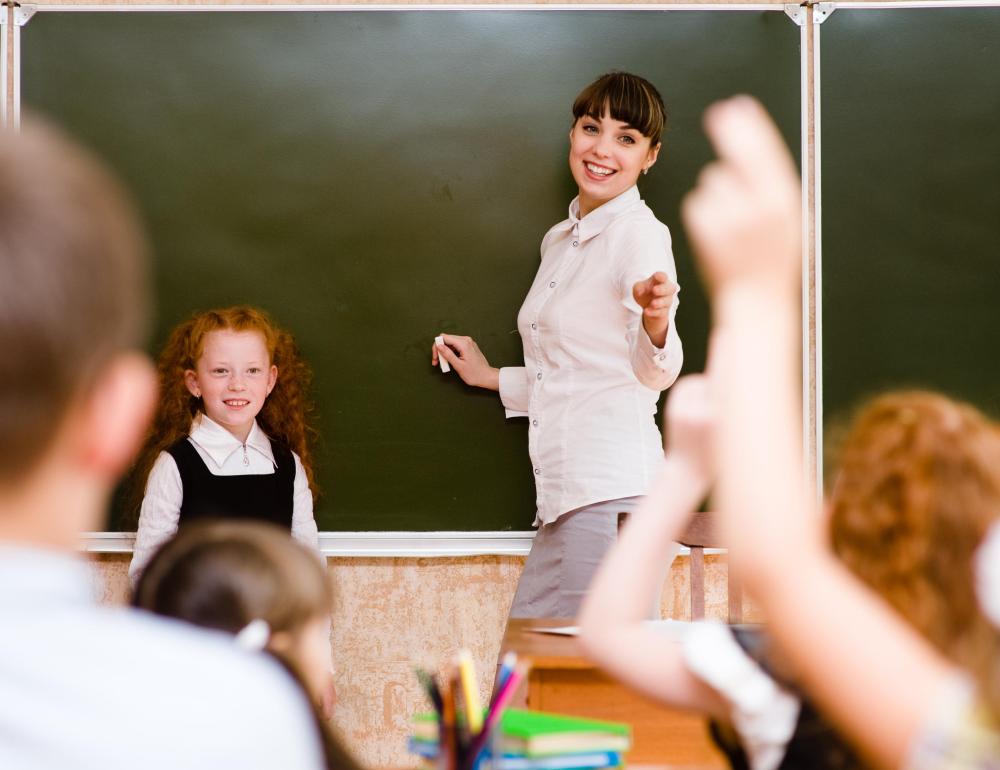At WiseGEEK, we're committed to delivering accurate, trustworthy information. Our expert-authored content is rigorously fact-checked and sourced from credible authorities. Discover how we uphold the highest standards in providing you with reliable knowledge.
What is Adaptive Training?
Adaptive training is a popular method of teaching a certain skill that involves gradually increasing the complexity of tasks. This type of training can be applied to many areas of personal, academic, and professional development. Psychologists, teachers, and parents might use adaptive training techniques to help young children improve their cognitive skills and comprehension of subject matter. Employers often start new workers off with simple, easy duties and increase their responsibilities as they become more familiar with the job. Finally, a special form of adaptive training is frequently built in to software and computer programs to allow users to master simple tasks before moving on to more difficult ones.
Most school systems are built upon the idea that students should be presented with basic, easy-to-comprehend ideas before being introduced to difficult and abstract concepts. As children progress through elementary and secondary school, they are faced with increasingly complex subject matter that requires higher and higher levels of cognitive skill. Learning mathematics is a strong example: students must be able to accurately add and multiply simple numbers before they can grasp fractions and algebraic variables.

In many classrooms, a more direct version of adaptive training takes place in which teachers and specialists work one-on-one with students to help them overcome certain difficulties, such as reading problems. A child who is behind in reading generally needs extra time and simpler instructions to begin to develop important skills. A specialist might play memory games with the child to help him or her remember sounds and correlate them with letters. Instructors or parents may read a story aloud to the student at first, then read it together, and finally allow the student to read it independently. With time and explicit adaptive training, individuals are often able to catch up to their peers and succeed academically.

In the professional world, adaptive training allows employees to gain a basic understanding of their job responsibilities before being asked to complete all tasks on their own. Many new workers receive formal or informal training to familiarize themselves with the terminology, techniques, and policies implemented in the job setting. An individual who gets a job as an insurance claims adjuster, for example, is not usually expected to start investigating complex, expensive claims at first. He or she usually begins by assisting and observing an experienced adjuster and taking on simple, straightforward jobs. Adaptive training in the workplace ensures that new employees become fully prepared for hard tasks.

New computer applications can be intimidating, and many software developers incorporate learning modules into their programs. People can get help with unfamiliar terms and learn what they can do with their systems before trying complex tasks. Some types of adaptive technology are designed to help people with certain disabilities, such as blindness, effectively use special computers and programs. An adaptive program may include voice recognition and applications that read on-screen material to users.
AS FEATURED ON:
AS FEATURED ON:















Discussion Comments
@MrsPramm - For some students there isn't a fallback though. They get stuck with a terrible teacher. That's going to be true for people in a workplace as well. They are only ever going to be able to learn as much as the person training them.
If they were trained using a standardized program with occasional input from human teachers I think that would be much more fair and give everyone an equal chance.
The problem with adaptive training in the hands of a human teacher is that they aren't always going to be able to recognize when someone needs to move on. A computer could be completely emotionless and objective about it, but a human might push too hard or not hard enough.
Still, I don't think we're at the stage where AI could handle this level of training so it's a moot point at the moment.
@irontoenail - I don't believe there will ever be an adequate substitute for human teachers, particularly good, well trained teachers. Adaptive training requires empathy and intuition, and can't just be measured through tests.
I'll give an example. When I was a very young student I used to do very badly at mathematics because I really didn't like my teacher. Luckily my mother fought for me to get a trial in the more advanced class and they finally allowed it, even though it's completely counter to logic that I would do better there.
I improved so much the teachers were astonished. But if I had been struggling because of some other reason and it was up to a computer to cater to my needs I'm sure I would have been lost in the system entirely.
I suspect that this kind of education will eventually be done entirely through computers. All you would have to do was to put the curriculum in small sections, and have the program identify when a student has become proficient in a particular area, so they could move on to the next level.
That kind of adaptive system wouldn't be too difficult to implement, I imagine it would just be difficult and time consuming to break each component of education down and provide a way of measuring it.
Post your comments